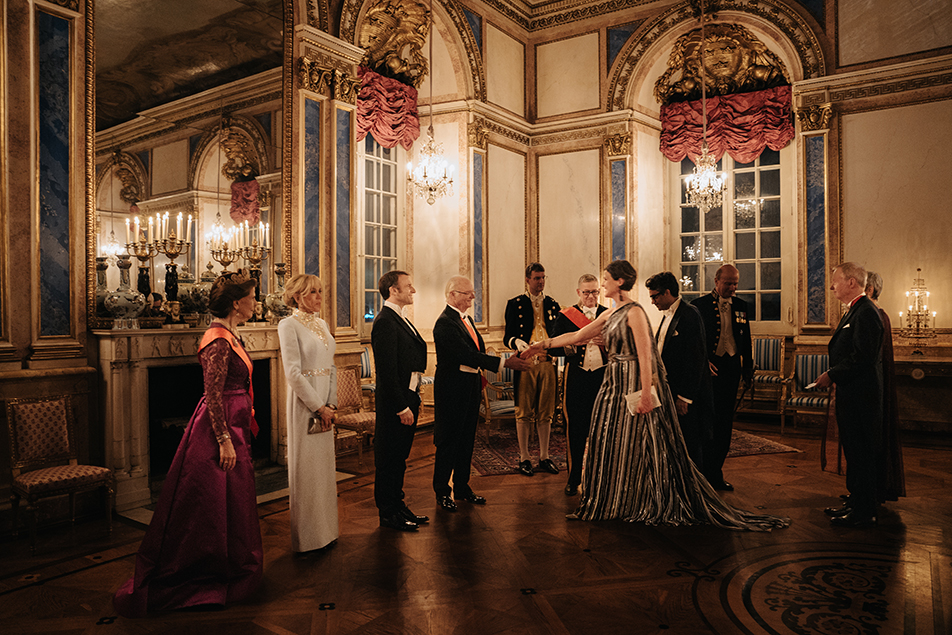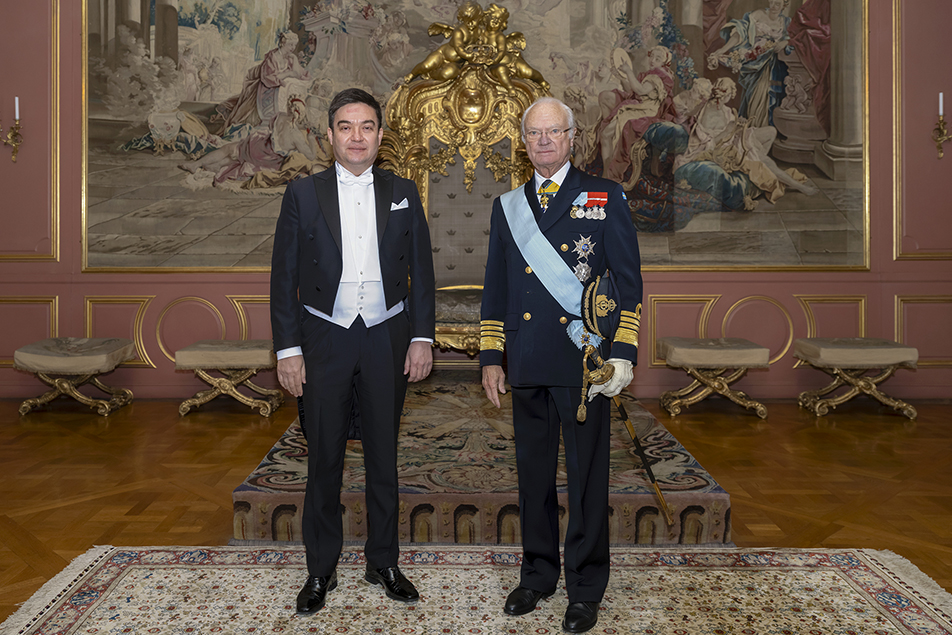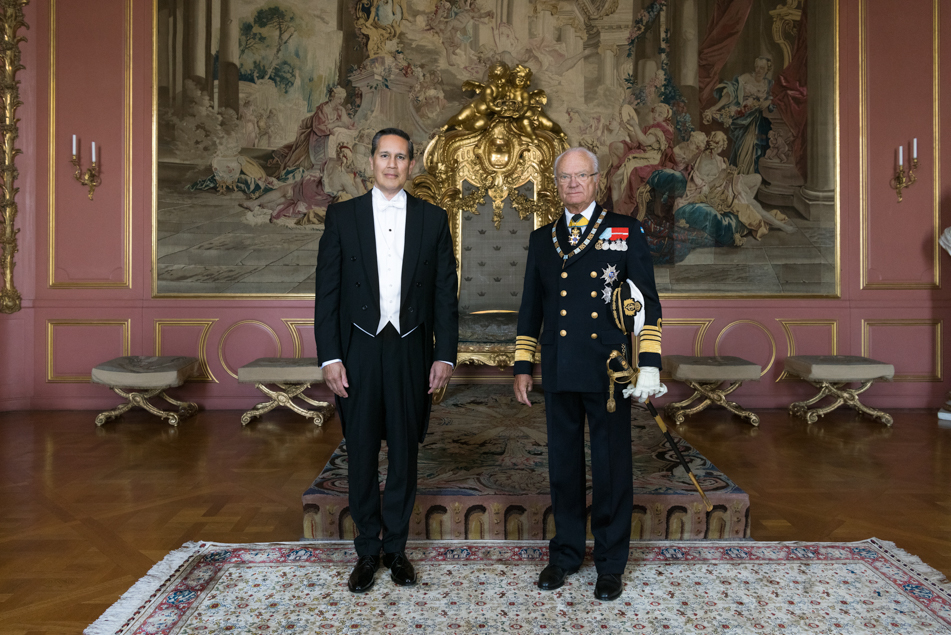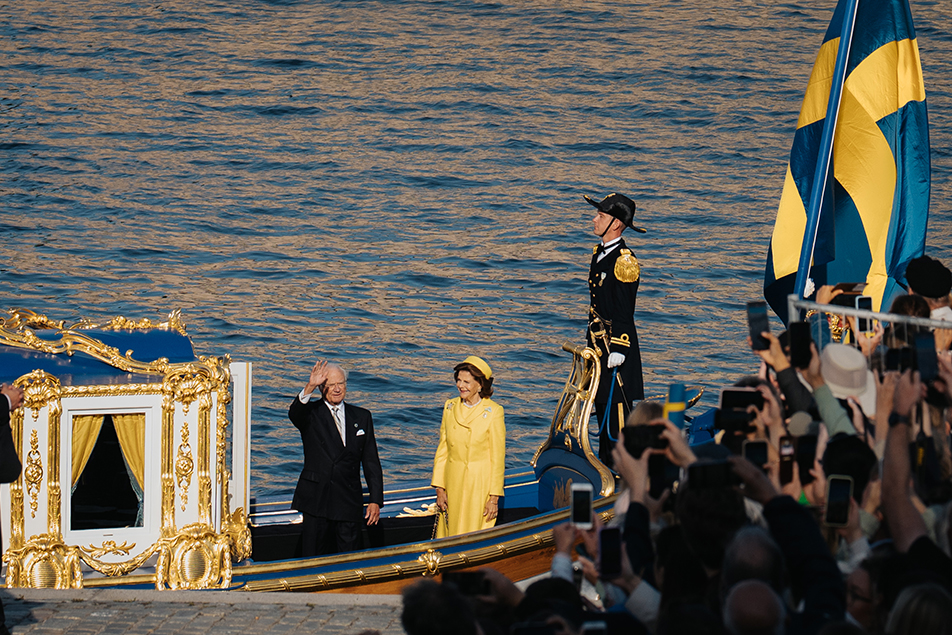Jubilee banquet at the Royal Palace
On the evening of 15 September, a jubilee banquet was served in the Hall of State at the Royal Palace as part of the celebrations for HM The King's 50th jubilee.
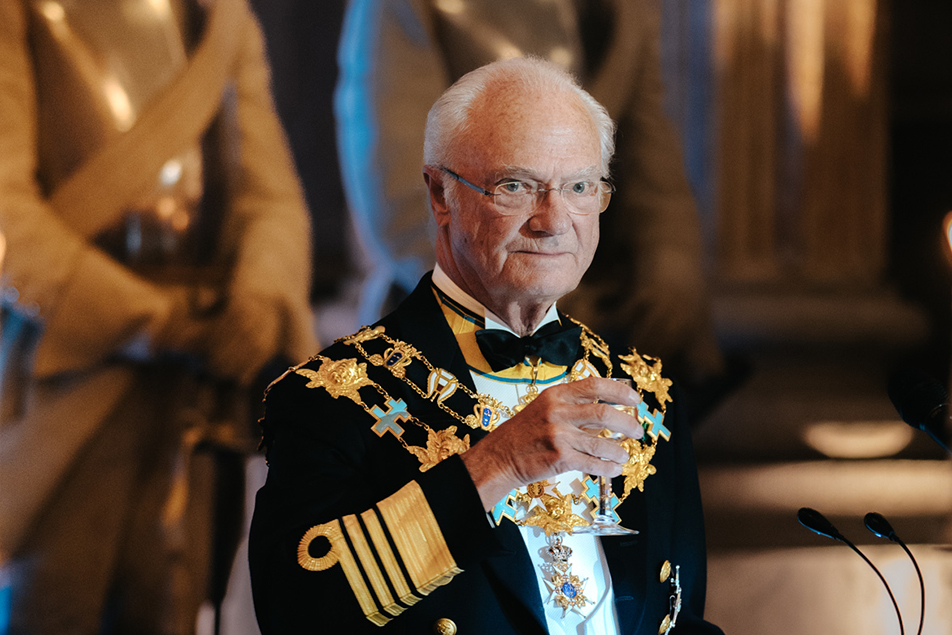
The King gave a welcoming address to the guests, and proposed a toast. Photo: Clément Morin/The Royal Court of Sweden
The guests included the Nordic heads of state and the heirs to the thrones, and representatives from the Government, the Riksdag, the diplomatic corps, authorities, science, industry and culture.
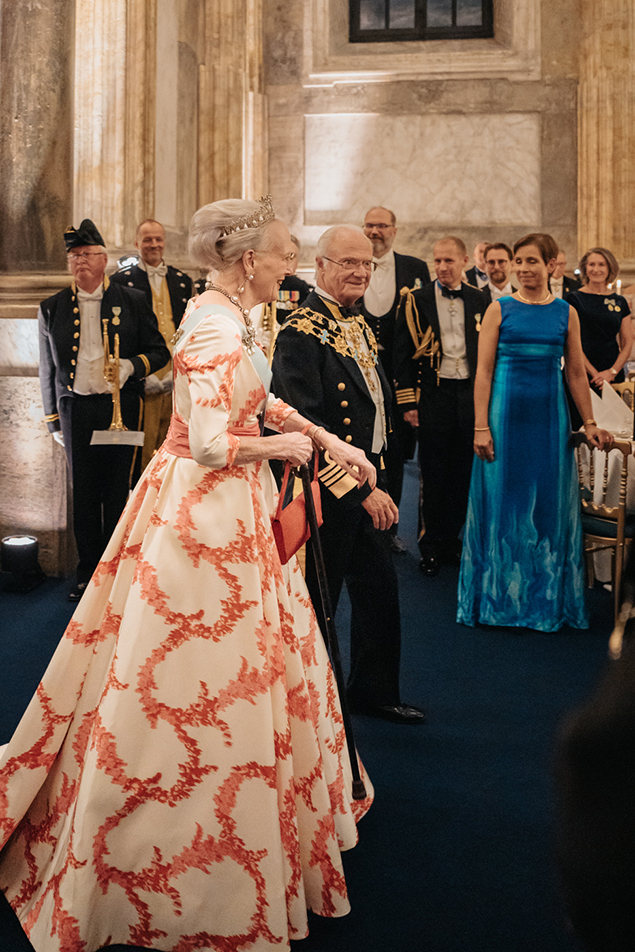
The King accompanied The Queen of Denmark to the table. Photo: Clément Morin/The Royal Court of Sweden
The banquet began with The King giving a welcoming address, in which he said:
You are all representatives of various sections of Swedish society.
“I would like to express my warm thanks to you, and to all those Swedes who have shown so much support, confidence and appreciation for my work during the 18,262 days that have passed since then.”
HM The King
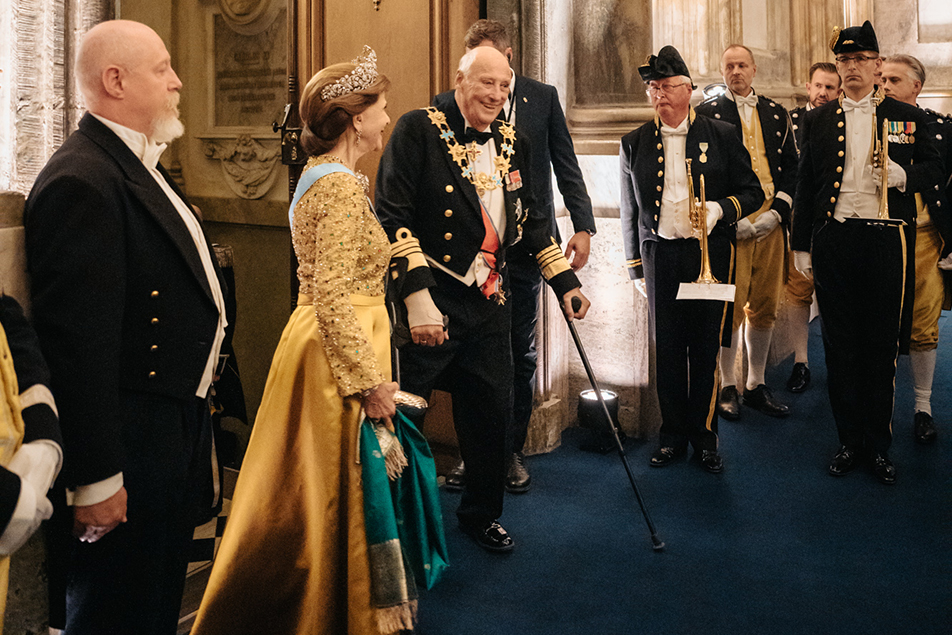
The Queen was accompanied to the table by The King of Norway. Photo: Clément Morin/The Royal Court of Sweden
Seating arrangements
- The King accompanied The Queen of Denmark to the table. The Queen of Norway was seated to his left
- The Queen was accompanied to the table by The King of Norway, and the President of Finland was seated to her right.
- The Crown Princess was accompanied to the table by Prime Minister Ulf Kristersson, and Iceland's President was seated to her right.
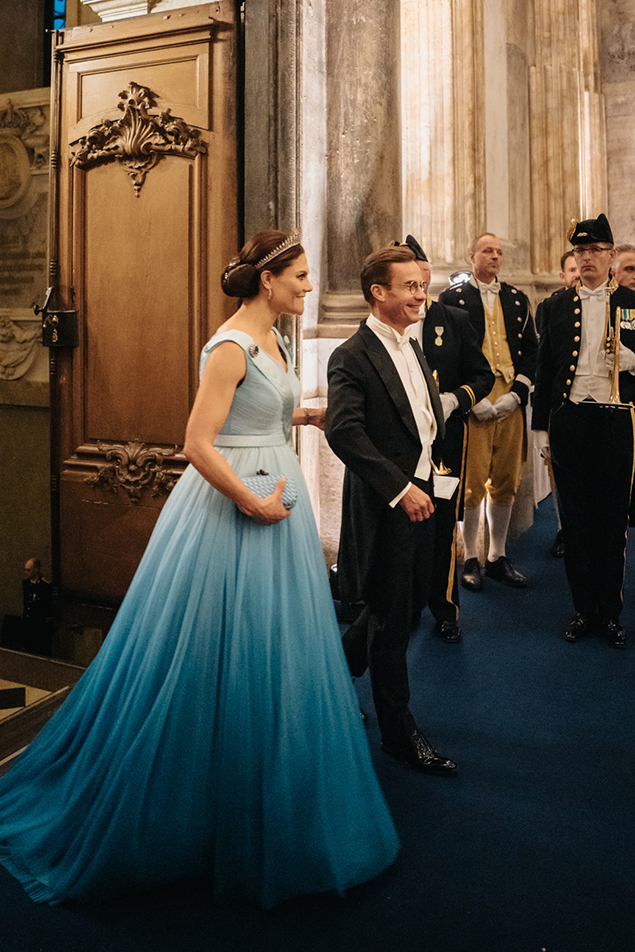
The Crown Princess and Prime Minster Ulf Kristersson arrive in the Hall of State. Photo: Clément Morin/The Royal Court of Sweden
- Prince Daniel accompanied The Crown Princess of Denmark to the table. Queen Anne-Marie was seated to his left.
- Princess Sofia was accompanied to the table by Count Michael Bernadotte af Wisborg, and First Deputy Speaker Kenneth G Forslund was seated to her right.
- Mr Christopher O'Neill accompanied Countess Jill Bernadotte af Wisborg to the table. Denmark's ambassador Kristina Miskowiak Beckvard was seated to his left.
- Princess Madeleine was accompanied to the table by Minister Tobias Billström, and Chairman Jacob Wallenberg was seated to her right.
- Prince Carl Philip accompanied Finance Commissioner Karin Wanngård to the table. Princess Christina, Mrs Magnuson was seated to his left.
Menu
Tartelette with green peas, tenderstem broccoli, broad beans, dill, buttermilk and horseradish
*
Pike-perch from Lake Mälaren and langoustines from Bohuslän with heads of dill, fennel and tomato
*
Saddle of venison from Södermanland with juniper berries, autumn mushrooms, celeriac and spruce shoot oil
*
Arctic raspberry from Norrbotten with vanilla, toasted almonds and browned butter
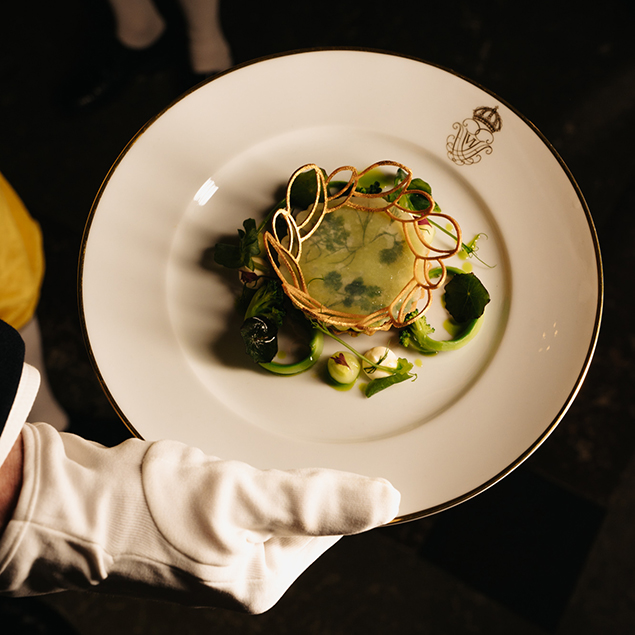
The starter at the jubilee banquet. Photo: Clément Morin/The Royal Court of Sweden
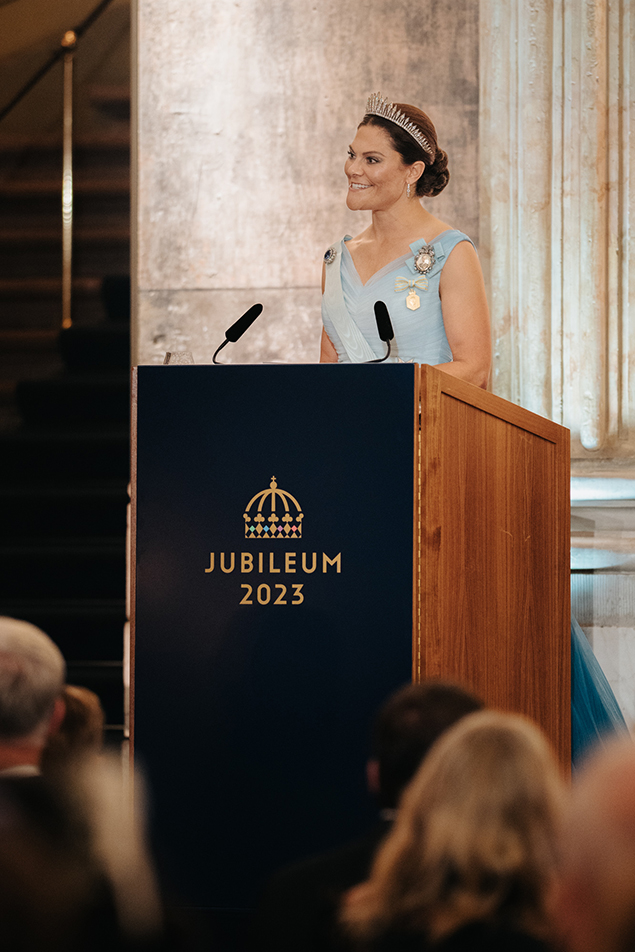
The Crown Princess gave a speech in honour of The King during the banquet. Photo: Clément Morin/The Royal Court of Sweden
During the banquet, The Crown Princess gave a speech to The King in which she said:
Dear father. You have a strong inner compass that guides you. You know that the landscape changes over time, and that old maps do not always stay up to date. In such cases, you have to choose a different path. The important thing is to keep a steady course.
“During the half a century that you have been king, our country has developed and our society has undergone significant changes. You have taken great pains to keep up, while defending traditions. For Sweden – With the Times.”
HRH The Crown Princess
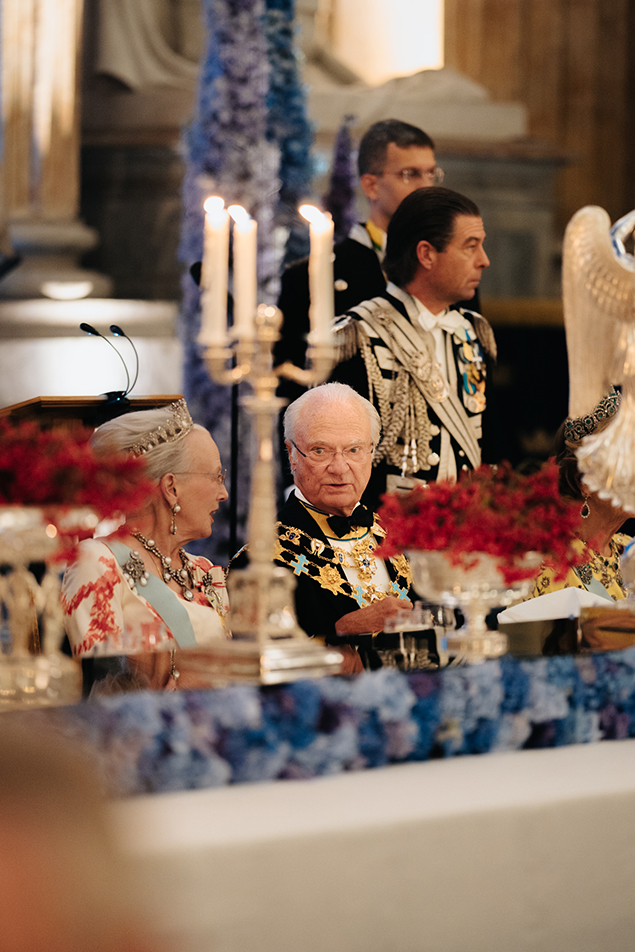
The King speaks with The Queen of Denmark. Photo: Clément Morin/The Royal Court of Sweden
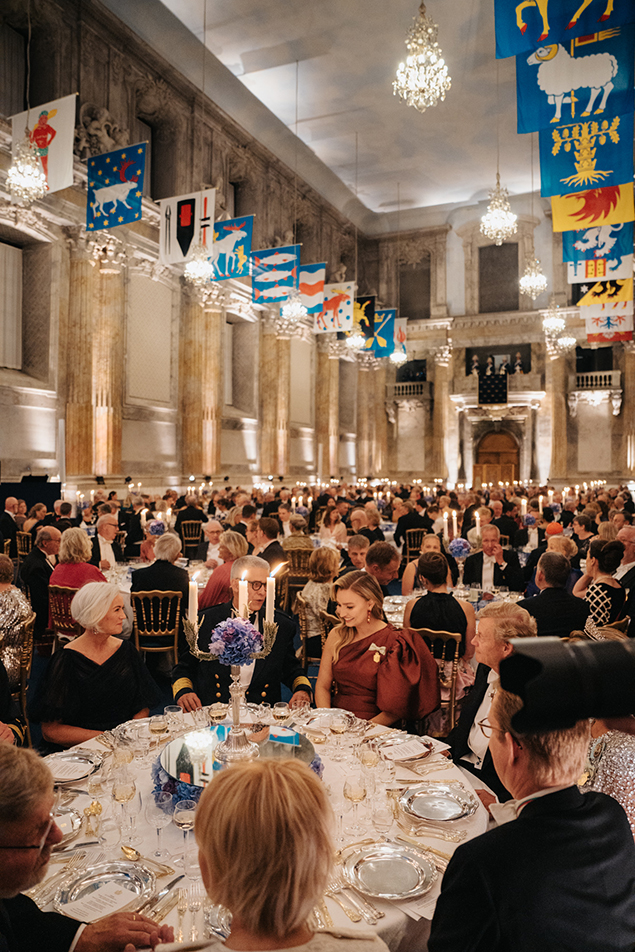
The guests during the banquet in the Hall of State. Photo: Clément Morin/The Royal Court of Sweden
The glassware, porcelain and cutlery
The glassware was a wedding present to The King and Queen in 1976 from the Swedish Government and the Riksdag, and was made at Kosta glassworks to a design by Sigurd Persson.
The porcelain used for the first course has a gilt lattice-work rim, and was made for King Gustav V and Queen Victoria by Rörstrand in 1910. The porcelain used for the fish course was commissioned for King Oskar I's wife, Queen Josefina, in the mid-19th century. The porcelain used for the meat course also dates from the mid-19th century, and was made in Berlin for Queen Victoria's mother, the Grand Duchess of Baden. The floral dessert dishes with their gilt lattice-work rims were made by Meissen in Saxony, Germany.
The majority of the cutlery was made for King Karl XIV Johan in Paris and Stockholm during the first half of the 19th century.
The Union Linen napkins and tablecloths were woven from damask in 1891 in Lille, France. The coat of arms of the Swedish-Norwegian union is woven into the centre of the napkin pattern.
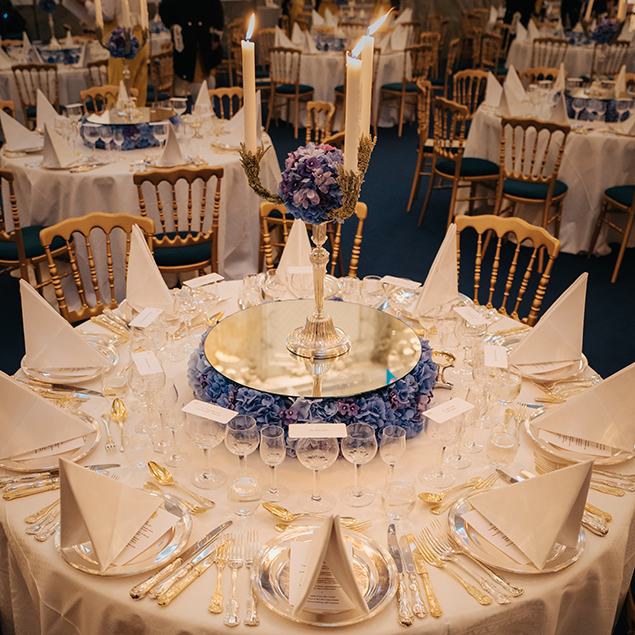
The candlesticks on the round tables in the Hall of State were made in Stockholm in the 18th century. Photo: Clément Morin/The Royal Court of Sweden
The table silver
The table silver on the table of honour was from the Brazilian silver service. The service is so called because it previously belonged to the Brazilian imperial family. Following the death of Empress Amalia in 1873 it was inherited by her sister, Queen Dowager Josefina of Sweden.
The candlesticks on the round tables were made in Stockholm in the late 18th century by Johan Abraham Hallard.
Decorations and flowers
The decorations consisted of the 25 provincial coats of arms and the coat of arms of the City of Stockholm, arranged on the frieze around the Hall of State. The banners were hung in a set order, with Uppland's coat of arms first and Stockholm's last, starting on the King's right-hand side.
The floral arrangements consisted of flowers in tones of blue that harmonised with the banners and the other decorations in the Hall of State. The arrangements included hydrangeas, delphiniums and African violets in shades of blue, complemented by rowanberries.
Musical entertainment
During the evening, the guests were entertained with music from Örebro Student Singers, guitarist Fredrik Berglund, and singers Hanna Husáhr and David Lindgren. They performed Änglamark by Evert Taube, Aspåkerspolska by Wilhelm Peterson-Berger and Anthem by Benny Andersson and Björn Ulvaeus.

